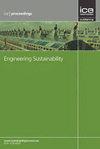Evaluating the impact of uncertainty events on the cost of highway construction project using Adaptive-Network-based Fuzzy Inference System
IF 2.5
4区 工程技术
Q3 ENGINEERING, CIVIL
Proceedings of the Institution of Civil Engineers-Engineering Sustainability
Pub Date : 2022-03-16
DOI:10.1680/jensu.21.00061
引用次数: 0
Abstract
This research examines the uncertainty events encountered in the process of constructing highways and evaluates their impact on South African highway construction costs. The rationale for this examination stems from the scholarly view that the costs of highway construction projects are underestimated due to the lack of appropriate evaluation of the impact of uncertainty events encountered in the construction process of highway projects. To counteract such underestimation, this research has developed an Adaptive Neuro-Fuzzy Inference System (ANFIS) as a simple advanced machine learning technique to assess the impact of uncertainty events involved in the construction of linear infrastructure projects. To validate the ANFIS model, the Stepwise Regression models (SRA) and Fuzzy Bayesian Network (FBN) have been designed, and their results are compared with the outputs of the ANFIS. The prediction performance comparison proved that the ANFIS has a higher performance than SRA and FBN with an accuracy degree of 99.15%, the margin of the error of 0.85% and excellent fitness (∼1) of the prediction model. Based on the result of the study, it can be deduced that the ANFIS model is a more accurate and reliable technique in assessing the impact of uncertainty events on the cost of the construction projects compared to the statistical and probabilistic models. Therefore, the study concludes that using hybrid intelligent machine learning techniques such as ANFIS not only minimises the time and difficulty of the estimation process but also reduces the potential inconsistency of correlation between variables in construction cost prediction. The model developed enables cost engineers to estimate the construction cost with a higher degree of accuracy.基于自适应网络的模糊推理系统评估不确定性事件对公路建设项目成本的影响
本研究考察了公路建设过程中遇到的不确定性事件,并评估了它们对南非公路建设成本的影响。这种审查的基本原理源于学术观点,即由于缺乏对公路项目建设过程中遇到的不确定性事件的影响的适当评估,公路建设项目的成本被低估了。为了抵消这种低估,本研究开发了一种自适应神经模糊推理系统(ANFIS),作为一种简单的先进机器学习技术,用于评估线性基础设施项目建设中涉及的不确定性事件的影响。为了验证ANFIS模型,设计了逐步回归模型(SRA)和模糊贝叶斯网络(FBN),并将其结果与ANFIS的输出结果进行了比较。预测性能比较表明,ANFIS的预测精度为99.15%,误差范围为0.85%,预测模型的拟合度(~ 1)优异,优于SRA和FBN。研究结果表明,与统计模型和概率模型相比,ANFIS模型在评估不确定性事件对建设项目成本的影响方面更为准确可靠。因此,该研究得出结论,使用混合智能机器学习技术(如ANFIS)不仅可以最大限度地减少估算过程的时间和难度,还可以减少建筑成本预测中变量之间相关性的潜在不一致。所建立的模型使造价工程师能够以更高的精度估算工程造价。
本文章由计算机程序翻译,如有差异,请以英文原文为准。
求助全文
约1分钟内获得全文
求助全文
来源期刊

Proceedings of the Institution of Civil Engineers-Engineering Sustainability
ENGINEERING, CIVIL-ENGINEERING, CIVIL
CiteScore
3.70
自引率
16.70%
发文量
44
审稿时长
>12 weeks
期刊介绍:
Engineering Sustainability provides a forum for sharing the latest thinking from research and practice, and increasingly is presenting the ''how to'' of engineering a resilient future. The journal features refereed papers and shorter articles relating to the pursuit and implementation of sustainability principles through engineering planning, design and application. The tensions between and integration of social, economic and environmental considerations within such schemes are of particular relevance. Methodologies for assessing sustainability, policy issues, education and corporate responsibility will also be included. The aims will be met primarily by providing papers and briefing notes (including case histories and best practice guidance) of use to decision-makers, practitioners, researchers and students.
 求助内容:
求助内容: 应助结果提醒方式:
应助结果提醒方式:


